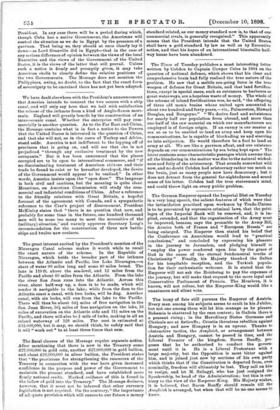We have dealt elsewhere with the President's announcement that America
intends to connect the two oceans with a ship canal, and will only say here that we hail with satisfaction the release of the isthmus from a kind of Anglo-Saxon mort- main. England will greatly benefit by the construction of an inter-oceanic canal. Whether the enterprise will pay com- mercially is another question. As to the Far East and China, the Message contains what is in fact a notice to the Powers that the United States is interested in the question of China, and that she will not, as in the cases of Turkey and Africa, stand aside. America is not indifferent to the lopping off of provinces that is going on, and will see that she is not prejudiced "through any exclusive treatment by the new occupants." But it has been announced that the places occupied are to be open to international commerce, and "if no discriminating treatment of American citizens and their trade be found to exist or be hereafter developed, the desire of the Government would appear to be realised." In other words, America insists upon the " open door." The language is both civil and cautious, but the meaning is quite clear. Meantime, an American Commission will study the com- mercial and industrial conditions of China. After a reference to the friendly relations with Great Britain, a hopeful forecast of the agreement with Canada, and a sympathetic reference to the Czar's project of disarmament, President McKinley states that " there is no question that now, and probably for some time in the future, one hundred thousand men will be none too many to meet the necessities of the (military) situation," and warmly approves Secretary Long's recommendation for the construction of three new battle- ships and twelve new cruisers.










































 Previous page
Previous page